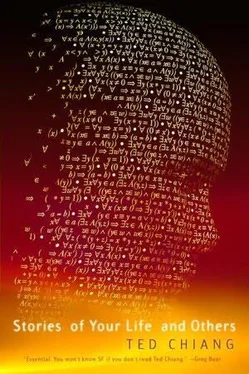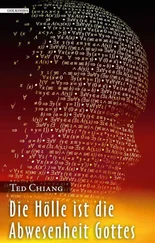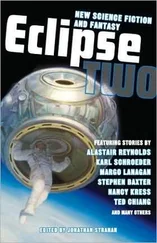Ted Chiang - Seventy-Two Letters
Здесь есть возможность читать онлайн «Ted Chiang - Seventy-Two Letters» весь текст электронной книги совершенно бесплатно (целиком полную версию без сокращений). В некоторых случаях можно слушать аудио, скачать через торрент в формате fb2 и присутствует краткое содержание. Жанр: Фантастика и фэнтези, на английском языке. Описание произведения, (предисловие) а так же отзывы посетителей доступны на портале библиотеки ЛибКат.
- Название:Seventy-Two Letters
- Автор:
- Жанр:
- Год:неизвестен
- ISBN:нет данных
- Рейтинг книги:3 / 5. Голосов: 1
-
Избранное:Добавить в избранное
- Отзывы:
-
Ваша оценка:
- 60
- 1
- 2
- 3
- 4
- 5
Seventy-Two Letters: краткое содержание, описание и аннотация
Предлагаем к чтению аннотацию, описание, краткое содержание или предисловие (зависит от того, что написал сам автор книги «Seventy-Two Letters»). Если вы не нашли необходимую информацию о книге — напишите в комментариях, мы постараемся отыскать её.
Seventy-Two Letters — читать онлайн бесплатно полную книгу (весь текст) целиком
Ниже представлен текст книги, разбитый по страницам. Система сохранения места последней прочитанной страницы, позволяет с удобством читать онлайн бесплатно книгу «Seventy-Two Letters», без необходимости каждый раз заново искать на чём Вы остановились. Поставьте закладку, и сможете в любой момент перейти на страницу, на которой закончили чтение.
Интервал:
Закладка:
Seventy-Two Letters
by Ted Chiang
When he was a child, Robert’s favorite toy was a simple one, a clay doll that could do nothing but walk forward. While his parents entertained their guests in the garden outside, discussing Victoria’s ascension to the throne or the Chartist reforms, Robert would follow the doll as it marched down the corridors of the family home, turning it around corners or back where it came from. The doll didn’t obey commands or exhibit any sense at all; if it met a wall, the diminutive clay figure would keep marching until it gradually mashed its arms and legs into misshapen flippers. Sometimes Robert would let it do that, strictly for his own amusement. Once the doll’s limbs were thoroughly distorted, he’d pick the toy up and pull the name out, stopping its motion in mid-stride. Then he’d knead the body back into a smooth lump, flatten it out into a plank, and cut out a different figure: a body with one leg crooked, or longer than the other. He would stick the name back into it, and the doll would promptly topple over and push itself around in a little circle.
It wasn’t the sculpting that Robert enjoyed; it was mapping out the limits of the name. He liked to see how much variation he could impart to the body before the name could no longer animate it. To save time with the sculpting, he rarely added decorative details; he refined the bodies only as was needed to test the name.
Another of his dolls walked on four legs. The body was a nice one, a finely detailed porcelain horse, but Robert was more interested in experimenting with its name. This name obeyed commands to start and stop and knew enough to avoid obstacles, and Robert tried inserting it into bodies of his own making. But this name had more exacting body requirements, and he was never able to form a clay body it could animate. He formed the legs separately and then attached them to the body, but he wasn’t able to blend the seams smooth enough; the name didn’t recognize the body as a single continuous piece.
He scrutinized the names themselves, looking for some simple substitutions that might distinguish two-leggedness from four-leggedness, or make the body obey simple commands. But the names looked entirely different; on each scrap of parchment were inscribed seventy-two tiny Hebrew letters, arranged in twelve rows of six, and so far as he could tell, the order of the letters was utterly random.
Robert Stratton and his fourth form classmates sat quietly as Master Trevelyan paced between the rows of desks.
“Langdale, what is the doctrine of names?”
“All things are reflections of God, and, um, all—”
“Spare us your bumbling. Thorburn, can you tell us the doctrine of names?”
“As all things are reflections of God, so are all names reflections of the divine name.”
“And what is an object’s true name?”
“That name which reflects the divine name in the same manner as the object reflects God.”
“And what is the action of a true name?”
“To endow its object with a reflection of divine power.”
“Correct. Halliwell, what is the doctrine of signatures?”
The natural philosophy lesson continued until noon, but because it was a Saturday, there was no instruction for the rest of the day. Master Trevelyan dismissed the class, and the boys of Cheltenham school dispersed.
After stopping at the dormitory, Robert met his friend Lionel at the border of school grounds. “So the wait’s over? Today’s the day?” Robert asked.
“I said it was, didn’t I?”
“Let’s go, then.” The pair set off to walk the mile and a half to Lionel’s home.
During his first year at Cheltenham, Robert had known Lionel hardly at all; Lionel was one of the day-boys, and Robert, like all the boarders, regarded them with suspicion. Then, purely by chance, Robert ran into him while on holiday, during a visit to the British Museum. Robert loved the Museum: the frail mummies and immense sarcophagi; the stuffed platypus and pickled mermaid; the wall bristling with elephant tusks and moose antlers and unicorn horns. That particular day he was at the display of elemental sprites: he was reading the card explaining the salamander’s absence when he suddenly recognized Lionel, standing right next to him, peering at the undine in its jar.
Conversation revealed their shared interest in the sciences, and the two became fast friends.
As they walked down the road, they kicked a large pebble back and forth between them. Lionel gave the pebble a kick, and laughed as it skittered between Robert’s ankles. “I couldn’t wait to get out of there,” he said. “I think one more doctrine would have been more than I could bear.”
“Why do they even bother calling it natural philosophy?” said Robert. “Just admit it’s another theology lesson and be done with it.” The two of them had recently purchased _A Boy’s Guide to Nomenclature_, which informed them that nomenclators no longer spoke in terms of God or the divine name. Instead, current thinking held that there was a lexical universe as well as a physical one, and bringing an object together with a compatible name caused the latent potentialities of both to be realized. Nor was there a single “true name” for a given object: depending on its precise shape, a body might be compatible with several names, known as its “euonyms,” and conversely a simple name might tolerate significant variations in body shape, as his childhood marching doll had demonstrated.
When they reached Lionel’s home, they promised the cook they would be in for dinner shortly and headed to the garden out back. Lionel had converted a tool shed in his family’s garden into a laboratory, which he used to conduct experiments. Normally Robert came by on a regular basis, but recently Lionel had been working on an experiment that he was keeping secret. Only now was he ready to show Robert his results. Lionel had Robert wait outside while he entered first, and then let him enter.
A long shelf ran along every wall of the shed, crowded with racks of vials, stoppered bottles of green glass, and assorted rocks and mineral specimens. A table decorated with stains and scorch marks dominated the cramped space, and it supported the apparatus for Lionel’s latest experiment: a cucurbit clamped in a stand so that its bottom rested in a basin full of water, which in turn sat on a tripod above a lit oil lamp. A mercury thermometer was also fixed in the basin.
“Take a look,” said Lionel.
Robert leaned over to inspect the cucurbit’s contents. At first it appeared to be nothing more than foam, a dollop of suds that might have dripped off a pint of stout. But as he looked closer, he realized that what he thought were bubbles were actually the interstices of a glistening latticework. The froth consisted of homunculi: tiny seminal foetuses. Their bodies were transparent individually, but collectively their bulbous heads and strand-like limbs adhered to form a pale, dense foam.
“So you wanked off into a jar and kept the spunk warm?” he asked, and Lionel shoved him. Robert laughed and raised his hands in a placating gesture. “No, honestly, it’s a wonder. How’d you do it?”
Mollified, Lionel said, “It’s a real balancing act. You have to keep the temperature just right, of course, but if you want them to grow, you also have to keep just the right mix of nutrients. Too thin a mix, and they starve. Too rich, and they get over lively and start fighting with each other.”
“You’re having me on.”
“It’s the truth; look it up if you don’t believe me. Battles amongst sperm are what cause monstrosities to be born. If an injured foetus is the one that makes it to the egg, the baby that’s born is deformed.”
“I thought that was because of a fright the mother had when she was carrying.” Robert could just make out the minuscule squirmings of the individual foetuses. He realized that the froth was ever so slowly roiling as a result of their collective motions.
Читать дальшеИнтервал:
Закладка:
Похожие книги на «Seventy-Two Letters»
Представляем Вашему вниманию похожие книги на «Seventy-Two Letters» списком для выбора. Мы отобрали схожую по названию и смыслу литературу в надежде предоставить читателям больше вариантов отыскать новые, интересные, ещё непрочитанные произведения.
Обсуждение, отзывы о книге «Seventy-Two Letters» и просто собственные мнения читателей. Оставьте ваши комментарии, напишите, что Вы думаете о произведении, его смысле или главных героях. Укажите что конкретно понравилось, а что нет, и почему Вы так считаете.











